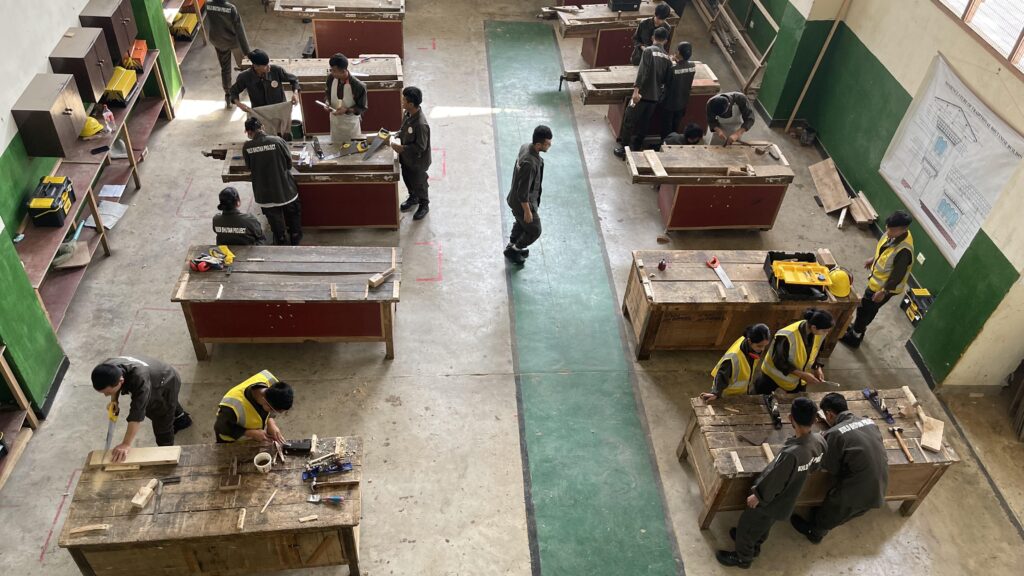In-Demand Skills: What Employers Are Looking For
Vocational education equips students with practical skills that are in high demand in the workforce. As a parent in Ontario, it’s crucial to understand what skills employers are looking for to better guide your child towards a successful career. Here’s a light-hearted yet informative look at the top in-demand skills and how vocational education can help your child acquire them.
Technical Skills: The Backbone of Vocational Success
Technical skills are the cornerstone of vocational education. Employers are always on the lookout for candidates who have hands-on experience and technical know-how. These skills vary by industry but often include proficiency in specific tools, software, and machinery.
For instance, in the trades, skills such as welding, carpentry, and electrical work are highly valued. In the tech sector, coding, network management, and cybersecurity are in high demand. Vocational programs in Ontario are designed to provide students with practical, real-world experience in these areas, ensuring they are job-ready upon graduation.
Soft Skills: The Unsung Heroes
While technical skills are essential, soft skills are equally important. Employers value candidates who can communicate effectively, work well in teams, and adapt to changing environments. These skills are often referred to as “people skills” and include traits like problem-solving, critical thinking, and emotional intelligence.
Vocational programs in Ontario often incorporate soft skills training into their curricula. Students might engage in group projects, presentations, and internships that help them develop these vital abilities. Encouraging your child to participate in extracurricular activities and community service can also boost their soft skills, making them more attractive to potential employers.
Digital Literacy: Navigating the Modern Workplace
In today’s digital age, digital literacy is a must-have skill. Employers are looking for candidates who are comfortable using various digital tools and platforms. This includes basic computer skills, familiarity with office software, and the ability to navigate online communication tools.
Many vocational programs now include digital literacy as part of their training. For example, a culinary arts program might teach students how to use digital ordering systems and inventory management software. Encouraging your child to explore online courses and resources can also enhance their digital literacy, giving them an edge in the job market.
Industry-Specific Certifications: The Golden Tickets
Industry-specific certifications can significantly boost a candidate’s employability. These certifications are often seen as proof of a candidate’s expertise and commitment to their field. Examples include certifications in project management, health and safety, and various technical trades.
Vocational programs often prepare students to take these certification exams, providing them with the knowledge and confidence needed to pass. Researching which certifications are valued in your child’s chosen industry can help them focus their efforts and stand out to potential employers.
Practical Experience: The Hands-On Advantage
Employers highly value practical experience because it demonstrates that a candidate can apply their skills in real-world situations. Vocational education excels in providing students with this hands-on experience through internships, apprenticeships, and lab work.
For example, a student in a healthcare vocational program might complete clinical rotations, gaining firsthand experience in patient care. A student in a technology program might work on live projects or in a company’s IT department. This practical experience not only enhances their resume but also builds their confidence and competence in their chosen field.
Continuous Learning: Staying Ahead of the Curve
The job market is constantly evolving, and employers value candidates who show a commitment to continuous learning. This means staying updated with the latest industry trends, technologies, and best practices.
Vocational education encourages a mindset of lifelong learning. Many programs offer continuing education courses, workshops, and seminars that help professionals stay current. Parents can support their children by encouraging them to take advantage of these opportunities and by fostering a love for learning and curiosity.
Networking: Building Professional Relationships
Networking is a critical skill that can open doors to job opportunities and career advancement. Employers often prefer to hire candidates who come recommended by trusted colleagues or industry contacts.
Vocational programs frequently offer networking opportunities through industry events, job fairs, and alumni associations. Encouraging your child to build and maintain professional relationships can help them tap into the hidden job market and find opportunities that are not advertised publicly.
Entrepreneurship: The Path to Innovation
Entrepreneurial skills are increasingly valued in today’s job market. Employers appreciate candidates who think creatively, take initiative, and can manage projects independently. These skills are particularly important in roles that involve innovation and leadership.
Vocational programs often include elements of entrepreneurship, teaching students how to start and manage their own businesses. This can be particularly beneficial for students interested in starting their own trades or tech ventures. Supporting your child’s entrepreneurial interests and encouraging them to pursue their ideas can set them on a path to success.

Apprenticeship Programs: Earning While Learning
Vocational education in Ontario offers exciting pathways for students through apprenticeship programs. These programs are a fantastic way to gain hands-on experience while earning money. Let’s dive into the world of apprenticeships and explore how they can benefit your child’s future career.
What is an Apprenticeship Program?
Apprenticeships combine on-the-job training with classroom instruction, allowing students to learn practical skills while working. They’re available in various trades and industries, from construction and automotive to culinary arts and healthcare.
In an apprenticeship program, your child will work under the guidance of experienced professionals, gaining valuable insights and expertise. This hands-on experience is complemented by classroom-based learning, where they’ll study the theory behind their trade. It’s a well-rounded approach that prepares them for a successful career.
Earning While Learning: A Financially Savvy Choice
One of the most significant advantages of apprenticeship programs is the ability to earn money while learning. Unlike traditional education routes that can leave students with hefty debt, apprenticeships provide a steady income.
Your child will be paid for their work, which means they can start supporting themselves financially right away. This income can help cover living expenses, educational costs, and even allow them to save for the future. It’s a win-win situation where they gain practical experience without the burden of student loans.
High Demand for Skilled Trades
Skilled trades are in high demand in Ontario and across Canada. Industries are facing a shortage of qualified workers, making apprenticeship programs even more valuable. By completing an apprenticeship, your child will have a competitive edge in the job market.
Trades such as plumbing, electrical work, carpentry, and welding offer excellent career prospects. These jobs are essential, and skilled tradespeople are always needed. An apprenticeship can lead to a stable, rewarding career with plenty of opportunities for advancement.
The Journey to Certification
Apprenticeship programs typically culminate in certification, which is a recognized credential in the industry. In Ontario, apprentices must complete a certain number of hours of on-the-job training and classroom instruction. Once these requirements are met, they can take the certification exam.
This certification is a testament to their skills and knowledge, making them highly employable. It opens doors to higher-paying positions and the possibility of starting their own business. The journey to certification is rigorous, but it’s a worthwhile investment in their future.
Exploring Different Apprenticeship Options
Ontario offers a wide range of apprenticeship programs, catering to various interests and career goals. Here are a few examples:
- Construction Trades: Programs for electricians, plumbers, and carpenters are popular and offer excellent career prospects.
- Automotive Trades: Apprenticeships in automotive service, collision repair, and heavy-duty equipment can lead to dynamic careers in the automotive industry.
- Culinary Arts: Aspiring chefs can benefit from apprenticeships in culinary programs, gaining experience in professional kitchens.
- Healthcare: Apprenticeships in fields like dental assisting and medical laboratory technology provide a gateway to healthcare careers.
Encouraging your child to explore these options can help them find a path that aligns with their interests and strengths.
Supporting Your Child Through the Apprenticeship Journey
As a parent, your support is crucial during your child’s apprenticeship journey. Here are a few ways you can help:
- Research: Help them research different apprenticeship programs and understand the requirements and benefits.
- Guidance: Provide guidance and encouragement as they navigate their options and make decisions about their future.
- Financial Planning: Assist with budgeting and financial planning to ensure they make the most of their earnings.
- Networking: Encourage them to build a professional network, which can be invaluable for career growth and opportunities.
Your involvement and support can make a significant difference in their success and confidence.
Industry Partnerships: Collaborations with Local Businesses

Industry partnerships are vital for the success of vocational education programs in Ontario. These collaborations provide students with hands-on experience, access to state-of-the-art equipment, and a direct link to potential employers. Let’s explore how these partnerships work and their benefits for your child’s vocational education journey.
Bridging the Gap Between Education and Employment
One of the primary goals of vocational education is to prepare students for the workforce. Industry partnerships help bridge the gap between education and employment by offering students real-world experience. Local businesses collaborate with vocational schools to create programs that meet industry standards and needs.
These partnerships ensure that the curriculum is relevant and up-to-date with current industry trends. Students gain practical skills that are directly applicable to their chosen field, making them more competitive in the job market. By working with industry professionals, students also get a glimpse of what their future careers might look like.
Access to Advanced Equipment and Technology
Vocational education programs often require specialized equipment and technology. Partnering with local businesses allows schools to access advanced tools and resources that might otherwise be unavailable. Companies may donate equipment, provide training, or even set up on-campus labs.
For example, a partnership with a local automotive company might provide students with the latest diagnostic tools and software used in the industry. This hands-on experience with cutting-edge technology ensures that students are well-prepared for their careers. It also helps schools keep their programs relevant and aligned with industry advancements.
Internship and Co-op Opportunities
Internships and co-op programs are an integral part of vocational education. Industry partnerships facilitate these opportunities by connecting students with local businesses willing to offer internships. These programs allow students to apply what they’ve learned in the classroom to real-world situations.
During an internship or co-op placement, students work under the guidance of experienced professionals. They gain valuable insights into their chosen field, develop professional networks, and often receive mentorship. These experiences can lead to job offers after graduation, as employers are more likely to hire someone who has already proven their skills and work ethic.
Building Professional Networks
Industry partnerships also help students build professional networks, which are crucial for career success. By collaborating with local businesses, vocational schools can organize networking events, job fairs, and guest lectures. These events give students the chance to meet industry professionals, ask questions, and learn about potential career paths.
Networking can lead to job opportunities, mentorship, and valuable advice from those already established in the field. Encouraging your child to take advantage of these opportunities can greatly enhance their career prospects. Building a strong professional network early on can open doors to internships, job placements, and future career growth.
Tailored Training Programs
Local businesses often work with vocational schools to develop tailored training programs. These programs are designed to meet the specific needs of the industry and the local job market. By aligning training programs with industry requirements, schools ensure that students are learning the skills that employers are looking for.
For instance, a partnership with a technology company might result in a specialized IT certification program. This program would cover the latest technologies and practices, making graduates highly sought after in the job market. Tailored training programs help students gain a competitive edge and increase their employability.
Support for Career Development
Industry partnerships go beyond just providing training and equipment. Many local businesses are invested in the long-term success of students. They may offer career development workshops, resume building sessions, and interview preparation. These resources help students transition from education to employment smoothly.
Career development support ensures that students are not only technically proficient but also prepared for the job search process. They learn how to present themselves professionally, write effective resumes, and succeed in interviews. This comprehensive approach to career preparation is a key benefit of industry partnerships.

Job Placement Services for: Schools with High Employment Rates
When it comes to vocational education, one of the biggest concerns for parents is whether their child will find a job after completing their program. Job placement services provided by vocational schools can make a significant difference in a student’s career prospects. Let’s dive into how these services work and highlight some vocational schools in Ontario with impressive employment rates.
The Importance of Job Placement Services
Job placement services are a crucial component of vocational education. These services help students transition from school to the workforce by offering a range of support, including resume building, interview coaching, and job search assistance. They also often have connections with local businesses, making it easier for students to find relevant job opportunities.
Having access to job placement services can greatly enhance your child’s chances of finding employment after graduation. These services provide personalized support to help students market themselves effectively and stand out to potential employers. With expert guidance, students can navigate the job market more confidently and secure positions in their chosen fields.
How Job Placement Services Work
Vocational schools with strong job placement services typically offer a comprehensive suite of resources. These may include career counseling, job fairs, on-campus recruitment events, and one-on-one coaching sessions. Career counselors work closely with students to understand their goals and develop a tailored job search strategy.
Resume and cover letter workshops help students create professional and compelling documents that highlight their skills and experience. Mock interviews provide practice and feedback, allowing students to refine their responses and improve their confidence. Additionally, schools often have partnerships with local employers, providing students with access to exclusive job listings and networking opportunities.
Top Vocational Schools with High Employment Rates
Several vocational schools in Ontario are known for their high employment rates and robust job placement services. These institutions go above and beyond to ensure their graduates find meaningful employment in their fields.
George Brown College
George Brown College in Toronto offers a wide range of vocational programs with strong job placement support. The college’s Career Services department provides resources such as job postings, career fairs, and workshops. Many programs also include co-op placements, giving students hands-on experience and a foot in the door with potential employers. George Brown’s focus on practical skills and industry connections results in high employment rates for graduates.
Humber College
Humber College, also in Toronto, is another top choice for vocational education with excellent job placement services. The Career Services and Co-operative Education Centre at Humber offers resume clinics, job search workshops, and networking events. Humber’s strong ties to industry ensure that students have access to valuable work placements and job opportunities. Graduates from Humber College often find employment quickly due to the college’s reputation and industry connections.
Fanshawe College
Located in London, Ontario, Fanshawe College provides extensive support for students entering the job market. The college’s Career Services team offers career counseling, job search assistance, and employer connections. Fanshawe’s co-op programs are particularly beneficial, giving students real-world experience and making them more attractive to employers. The high employment rate among Fanshawe graduates speaks to the effectiveness of their job placement services.
Maximizing the Benefits of Job Placement Services
Encourage your child to take full advantage of the job placement services offered by their vocational school. Starting early and engaging with these services throughout their education can make a significant difference in their job search success. Here are some tips to help your child maximize these benefits:
- Attend Workshops and Seminars: Encourage your child to participate in resume building, interview preparation, and job search strategy workshops. These sessions provide valuable insights and practical skills.
- Utilize Career Counseling: Career counselors can offer personalized advice and help students create a targeted job search plan. Regular meetings with a counselor can keep your child on track and motivated.
- Engage in Networking Opportunities: Job fairs, on-campus recruitment events, and industry networking sessions are excellent opportunities for students to connect with potential employers. Encourage your child to attend these events and make professional connections.
- Apply for Co-op and Internship Programs: Gaining practical experience through co-op placements or internships is invaluable. These opportunities not only provide hands-on skills but also often lead to job offers.



